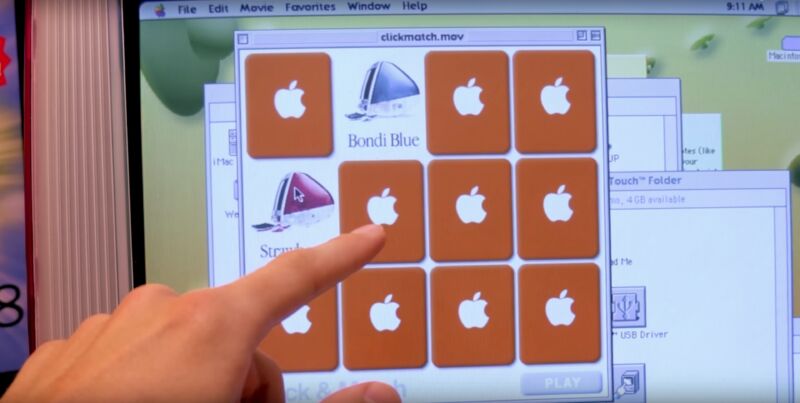
Enlarge / It only cost Michael MJD nearly $1,800, plus a replacement display controller, to get to the point where he could play the memory game on a classic iMac. (credit: Michael MJD / YouTube)
Two remarkable things appear in a recent Michael MJD video. One is an iMac G3 from 1999 that responds to not just touchscreen taps and drags, but also touch pressure. The other is a sticker on the side of the Strawberry tray-loading iMac, indicating that it was an "Engineering Prototype" from Elo, a company that was an official "Value Added Reseller" for Apple products.
The first iMac's release was 25 years ago last month. The device was a breakthrough on many levels. The transparent brightly colored plastic, the streamlined shape with rounded corners, and the bold-for-the-time choice to forgo floppy drives and myriad other PC ports made the G3 a style icon, to the point where the G3 is part of the Museum of Modern Art's permanent collection. It rebuilt and fortified Apple's position in the tech landscape. And, not for nothing, it kicked off an era-defining surge in transparent design.
Elo's touchscreen Mac was meant to work as a kiosk but survived until today to become a remarkable oddity.
The iMac G3 heralded some of Apple's future strategies and focus, but the company and its business model contained many aspects of an earlier era. Elo, a company that continues to make touchscreens for point-of-sale systems and other applications, turned some iMacs into touchscreen kiosks, with Apple's approval as a "Value Added Reseller." As Michael MJD points out in his video, the iMac made sense as a good-looking computer you could park on a surface and allow people to manipulate without a keyboard or mouse. What's more, Elo was only one of three known companies offering this kind of third-party touchscreen conversion.
Read 3 remaining paragraphs | Comments

Enlarge / It only cost Michael MJD nearly $1,800, plus a replacement display controller, to get to the point where he could play the memory game on a classic iMac. (credit: Michael MJD / YouTube)
Two remarkable things appear in a recent Michael MJD video. One is an iMac G3 from 1999 that responds to not just touchscreen taps and drags, but also touch pressure. The other is a sticker on the side of the Strawberry tray-loading iMac, indicating that it was an "Engineering Prototype" from Elo, a company that was an official "Value Added Reseller" for Apple products.
The first iMac's release was 25 years ago last month. The device was a breakthrough on many levels. The transparent brightly colored plastic, the streamlined shape with rounded corners, and the bold-for-the-time choice to forgo floppy drives and myriad other PC ports made the G3 a style icon, to the point where the G3 is part of the Museum of Modern Art's permanent collection. It rebuilt and fortified Apple's position in the tech landscape. And, not for nothing, it kicked off an era-defining surge in transparent design.
Elo's touchscreen Mac was meant to work as a kiosk but survived until today to become a remarkable oddity.
The iMac G3 heralded some of Apple's future strategies and focus, but the company and its business model contained many aspects of an earlier era. Elo, a company that continues to make touchscreens for point-of-sale systems and other applications, turned some iMacs into touchscreen kiosks, with Apple's approval as a "Value Added Reseller." As Michael MJD points out in his video, the iMac made sense as a good-looking computer you could park on a surface and allow people to manipulate without a keyboard or mouse. What's more, Elo was only one of three known companies offering this kind of third-party touchscreen conversion.
Read 3 remaining paragraphs | Comments
September 12, 2023 at 12:11AM

Post a Comment